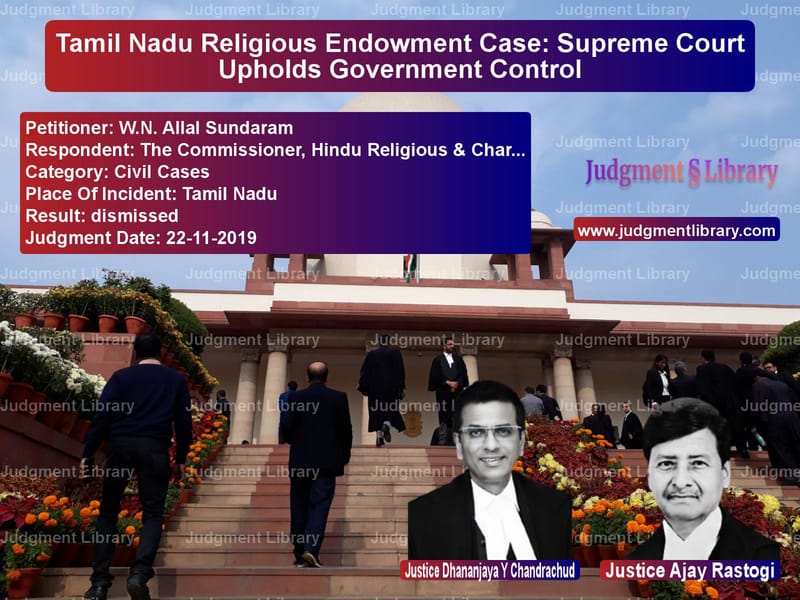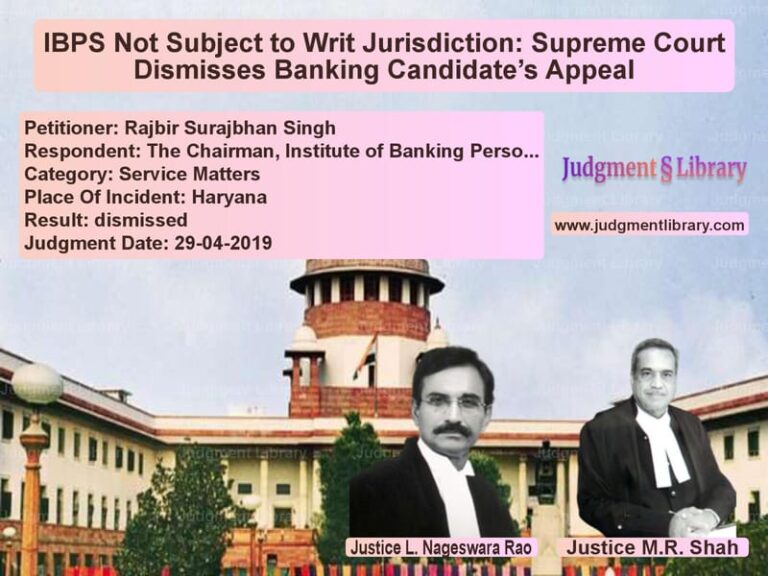Tamil Nadu Religious Endowment Case: Supreme Court Upholds Government Control
The case of W.N. Allal Sundaram vs. The Commissioner, Hindu Religious & Charitable Endowments Administration Department & Ors. dealt with the legal classification of a religious endowment under the Tamil Nadu Hindu Religious and Charitable Endowments Act, 1959 (hereinafter referred to as the “Act of 1959”). The Supreme Court had to determine whether the Bagyammal Trust was a ‘specific endowment’ under the Act and whether the Tamil Nadu government had the authority to regulate its administration.
The judgment clarified the legal distinction between private and public religious trusts, the powers of the state over religious endowments, and the constitutional implications of such regulation.
Background of the Case
The appellant, W.N. Allal Sundaram, filed a suit before the City Civil Court, Madras, challenging the order of the Commissioner, Hindu Religious & Charitable Endowments (HR&CE) Administration Department, which classified the Bagyammal Trust as a ‘specific endowment’ under the Act of 1959.
The appellant contended that:
- The trust was a private religious trust and not subject to government control.
- The property had been passed down through family members, retaining its private character.
- The trust had no history of public usage that would qualify it as a public religious endowment.
However, the Deputy Commissioner of HR&CE had ruled otherwise, holding that the Bagyammal Trust was a specific endowment under Section 6(19) of the Act of 1959. This decision was upheld by the Commissioner, leading to the legal challenge before the City Civil Court.
Petitioner’s Arguments (W.N. Allal Sundaram)
The appellant argued:
- The trust was a private family trust created for religious purposes but was never meant for public use.
- The property had been maintained by successive generations, without interference from the government or the public.
- The Act of 1959 did not apply, as the trust was never dedicated to the public.
- The Commissioner’s order was arbitrary and in violation of the appellant’s property rights under Article 300A of the Indian Constitution.
Respondent’s Arguments (HR&CE Department)
The state government countered:
- The Bagyammal Trust had been used for religious purposes, with clear evidence of public participation.
- The trust was associated with a Hindu temple, fulfilling the definition of a ‘specific endowment’ under Section 6(19) of the Act.
- The trust deed itself mentioned its usage for religious charity, indicating its public nature.
- The government had the authority to regulate religious institutions to prevent mismanagement and ensure proper use of religious endowments.
Supreme Court’s Judgment
The Supreme Court upheld the decisions of the HR&CE Department and the High Court, ruling in favor of the state government. The key findings of the Court were:
- The Bagyammal Trust fell within the definition of a ‘specific endowment’ under the Act of 1959.
- The trust deed clearly indicated that the property was meant for religious charity and public benefit.
- The history of the trust demonstrated public participation, confirming its status as a public religious endowment.
- The government had the right to regulate religious endowments to prevent mismanagement and ensure transparency.
The Court stated:
“The property was endowed specifically for the performance of a religious charity in the temple and was covered within the scope of definition of ‘specific endowment’ in Section 6(19) of the Act of 1959.”
Key Takeaways
- Private trusts can become public endowments if their usage and history demonstrate public participation.
- The Tamil Nadu government has the authority to regulate religious endowments under the Act of 1959.
- Courts will look beyond mere legal ownership and examine the actual function and purpose of religious trusts.
- Religious endowments cannot be claimed as private property if they are used for public religious purposes.
- This ruling reinforces the government’s role in overseeing religious institutions to prevent mismanagement.
This judgment sets a significant precedent in determining the public or private nature of religious endowments and affirms the state’s power to regulate such institutions in the interest of public welfare.
Petitioner Name: W.N. Allal Sundaram.Respondent Name: The Commissioner, Hindu Religious & Charitable Endowments Administration Department & Ors..Judgment By: Justice Dhananjaya Y Chandrachud, Justice Ajay Rastogi.Place Of Incident: Tamil Nadu.Judgment Date: 22-11-2019.
Don’t miss out on the full details! Download the complete judgment in PDF format below and gain valuable insights instantly!
Download Judgment: W.N. Allal Sundaram vs The Commissioner, Hi Supreme Court of India Judgment Dated 22-11-2019.pdf
Direct Downlaod Judgment: Direct downlaod this Judgment
See all petitions in Property Disputes
See all petitions in Succession and Wills
See all petitions in Consumer Rights
See all petitions in Judgment by Dhananjaya Y Chandrachud
See all petitions in Judgment by Ajay Rastogi
See all petitions in dismissed
See all petitions in supreme court of India judgments November 2019
See all petitions in 2019 judgments
See all posts in Civil Cases Category
See all allowed petitions in Civil Cases Category
See all Dismissed petitions in Civil Cases Category
See all partially allowed petitions in Civil Cases Category







